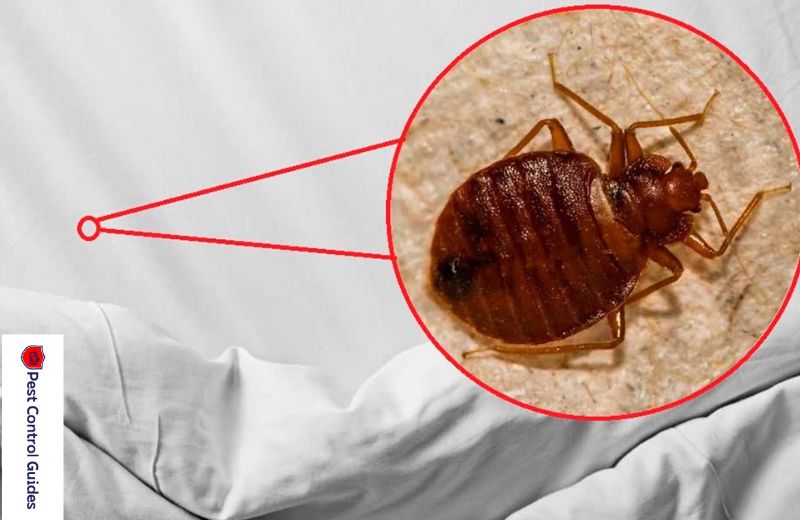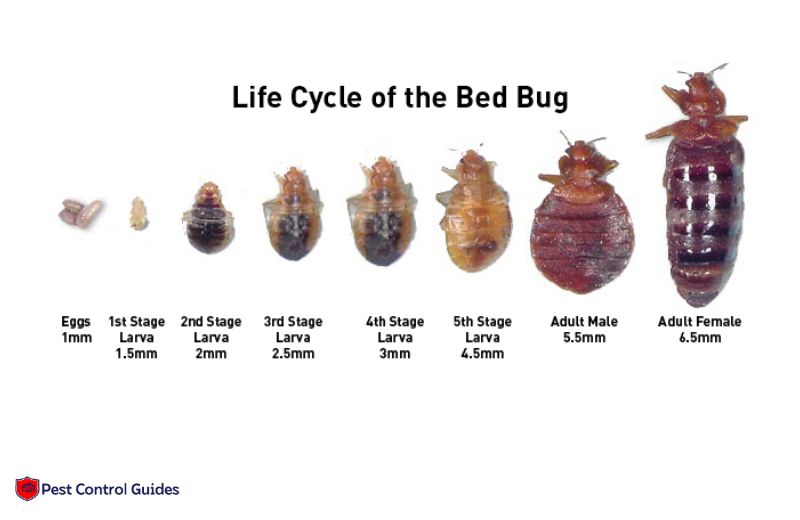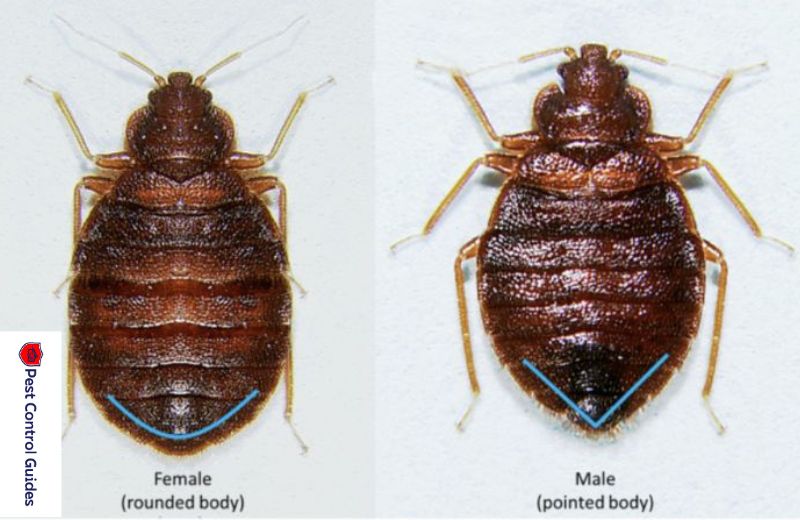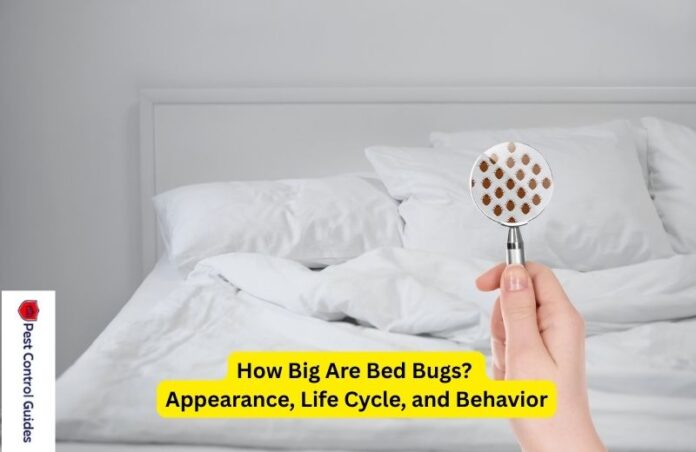Bed bugs are small, sneaky pests that can make life uncomfortable. They hide in cracks, furniture, and mattresses, waiting to feed on blood. If you suspect an infestation, understanding their size, life cycle, and habits will help you deal with them quickly and effectively. This guide will explain everything about these tiny creatures in simple terms.
How Big Are Bed Bugs?
Bed bugs are very small and hard to spot. Adult bed bugs are about the size of an apple seed. They measure between 5 to 7 millimeters, or about a quarter-inch. After feeding, they become plump and may look nearly double their size. Bed bug nymphs, or baby bed bugs, are even tinier—only about 1 to 2 millimeters long. They are pale and almost clear, making them difficult to see. Read our latest post on Can You See Bed Bugs with Your Eyes? Size, Identification, Removal, Prevention
How Do You Identify Bed Bugs?

Spotting bed bugs isn’t easy, but there are clear signs to watch for:
- Bed bug bites appear as small, red, itchy bumps that usually form a line or cluster.
- Tiny bed bug eggs or egg shells, which are white and easy to miss, may be found near hiding spots.
- Reddish stains or small black dots on your sheets could indicate their droppings or crushed bugs.
- Seeing live bugs crawling slowly in mattress seams or furniture cracks usually means an infestation.
Healthline describes these signs as important for confirming the presence of bed bugs. Read also What Kills Bed Bugs Instantly and Permanently at Home in 2025
What Is the Life Cycle of Bed Bugs?

The life cycle of bed bugs consists of three main stages:
- Egg Stage
Female bed bugs lay tiny white eggs in hidden areas, such as cracks in bed frames. Each female can lay up to 5 eggs per day and hundreds in her lifetime.
- Nymph Stage
When the eggs hatch, bed bug nymphs emerge. They are smaller than a pinhead and can grow bigger after feeding on blood. Nymphs shed their skins five times before becoming adults.
- Adult Stage
After several weeks of feeding and molting, nymphs turn into adults. They are reddish-brown and flat and can live up to one year in good conditions.
The Environmental Protection Agency (EPA) confirms that bed bugs can live for months without feeding, making infestations harder to control.
What Are the Habits of Bed Bugs?
Understanding bed bug habits can help you identify and eliminate them. These pests are known for:
- Nocturnal Feeding: Bed bugs are most active at night. They feed on people and animals while they sleep.
- Hiding Spots: During the day, bed bugs hide in cracks, mattress seams, couch cushions, and even behind wallpaper. They avoid light and prefer dark, quiet spaces.
- Spreading by Hitchhiking: Bed bugs travel by clinging to luggage, clothing, and furniture. They infest homes, hotels, and even public spaces.
Healthline explains that their ability to move and hide quickly makes them challenging to eliminate.
Unique Characteristics of Bed Bugs
Bed bugs are different from other insects in several ways:
- They don’t jump or fly but can crawl quickly.
- Their bites usually appear in straight lines or groups.
- They have an oval, flat body that allows them to hide in tiny spaces.
Male vs. Female Bed Bugs

It’s hard to tell male and female bed bugs apart without looking closely. Females have rounder abdomens to hold eggs, while males have pointed abdomens. A magnifier can make these features easier to spot.
Read Our Most Recently Published Guides on Termites, Earwigs, Fruit Flies and Gnats:
- How to Get Rid of Bed Bugs Permanently at Home Naturally in 2025
- How Much Does it Cost to Get Rid of Bed Bugs? 2025 Pricing Guide
- Baby Termites vs Ants? How to Tell the Difference
- How Big are Termites? How to Identify Termites and Treatment
- Fruit Flies vs Gnats: How to Tell the Difference in 2025
- Fungus Gnats vs Fruit Flies: How to Tell the Difference in 2025
- Where Do Gnats Come From in the House? Prevention and Treatment Tips
- How to Get Rid of Gnats in House Quickly? Step-by-Step Process
- How to Get Rid of Earwigs in Your House Fast?
Final Steps to Handle Bed Bugs
Dealing with bed bugs can be challenging, but early detection and the right methods make a big difference. Look for signs like bed bug bites, eggs, and stains on your sheets. Use effective solutions like heat treatment, diatomaceous earth, and vacuuming to control infestations. For severe cases, don’t hesitate to call a professional exterminator. Acting quickly can prevent the problem from spreading and help you reclaim your home from these pesky invaders. Follow Us on Facebook, Pinterest and Twitter for the latest updates.
FAQs
What Is the Life Cycle of a Bed Bug?
The bed bug life cycle includes three stages—egg, nymph, and adult. It takes about 6 weeks from egg to adulthood.
What Are the Habits of Bed Bugs?
Bed bug habits include feeding at night, hiding in cracks during the day, and traveling by attaching to items like luggage and furniture.
What Kills Bed Bugs?
Heat treatment, steam cleaning, and diatomaceous earth are some of the most effective methods. Combining these with professional help gives the best results.
What’s the Fastest Way to Get Rid of Bed Bugs?
Hire a professional exterminator for rapid elimination. They use proven methods like extreme heat or specialized chemicals.
How Fast Do Bed Bugs Multiply?
Bed bugs lay 3-5 eggs each day. A small infestation can grow into a serious problem in just a few weeks.
How to Destroy Bed Bug Eggs?
Steam that’s at least 170°F or diatomaceous earth can kill bed bug eggs and prevent further spreading.
What Are the Unique Characteristics of Bed Bugs?
They avoid light, hide well in small spaces, and survive for months without food.
Do Bed Bugs Bite Every Night?
No, they typically feed every 5 to 10 days. However, with a large infestation, bites might appear daily.



